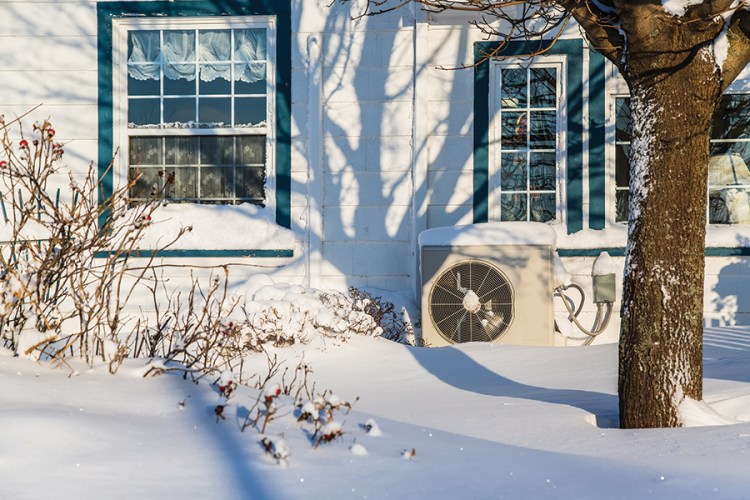By Wanda Curtis

Falling leaves and chilly mornings are reminders that winter is just around the corner. That may generate concern for some people because of high heating and electric bills often incurred during the winter months. It’s not too late, however, to begin planning to reduce those costs. There are many ways to reduce heating and electric bills without making expensive renovations.
Energy Star appliances
According to energy.gov, one way to decrease electric bills is to purchase energy efficient products and operate them efficiently. Fortin’s Home Furnishings in Winslow sells a number of Energy Star rated appliances which are independently certified and built to standards that make them energy efficient. Fortin salesman John Hachey said that Energy Star washers, refrigerators and dishwashers all are more energy efficient.
“Energy Star rated washers use about 25% less energy and about 30% less water,” said Hachey. “Energy Star rated refrigerators are approximately 8-10% more energy efficient. Energy Star rated dishwashers are approximately 10% more energy efficient and will save, on average, 3,500 gallons of water over their lifetime. Efficiency Maine is currently offering a $50 mail-in rebate on the purchase of an Energy Star washing machine.”
Heat pumps
Another suggestion for decreasing electric bills offered on energy.gov is to invest in a heat pump. The authors of that site report that heat pumps can result in significant savings on electric bills. Heat pumps take heat from the air or in the ground and move it indoors. Rather than producing heat like some types of heating systems, the heat pump transports existing heat, which requires less energy. During the summer months, heat pumps can be used to extract warm air from the inside of the home, which helps to keep the home cool.
One of the owners of Dave’s Appliance in Winthrop, Mike Ketchen, manages their heat pump division. Ketchen said that heat pumps can heat for 30-40% less cost than other petroleum-based heating systems (excluding natural gas) in optimal conditions. He said that once the outdoor temperature reaches minus 15 degrees, the efficiency of the heat pump decreases. He said that many homeowners are investing in heat pumps as a supplement to their existing heating system to decrease overall heating costs.
In regards to the cost of a heat pump, Ketchen explained that heat pumps can be used to heat one section of a home or an entire structure. The cost of the heat pump depends on the size of the zone that will be heated.
“Prices for installed heat pumps range from $2,800 to $4,500 for a single zone unit,” said Ketchen. And, he added, “We service everything that we sell.”
According to Ketchen, heat pumps are operated with a remote control, are very easy to use and require little maintenance. His employees install about 350 systems each year and the number keeps growing.
“We’ve been selling heat pumps since 2004,” said Ketchen. “Technology has greatly improved during the past ten to fifteen years and heat pumps can now operate very efficiently in a climate like ours. We’re riding the wave of technology and selling a lot of heat pumps. Efficiency Maine is currently offering a $500 rebate to homeowners who install a single unit in their home and a $750 rebate to homeowners who install more than one unit.”
Practical ways to reduce home energy costs
In addition to using Energy Star rated appliances and heat pumps, there are other steps that can be taken to reduce energy costs.
– Unplug televisions, microwaves, blenders, mixers, microwaves and printers when not in use.
– Unplug power strips when the devices plugged into the power strip aren’t in use.
– Unplug battery chargers once batteries are fully charged or it’s not in use.
– Turn off lights when leaving a room.
– Wash clothes in cold water with cold water detergent. Use appropriate water level settings for the size load that is being washed.
– Wash and dry full loads. Clean the lint filter in the dryer after every load to improve air circulation.
– Inspect the dryer vent periodically to keep it from getting plugged.
– Air dry clothes whenever possible.
– Insulate your home. That prevents heat loss in the winter and keeps the home cooler in summer.
– Caulk and weather-strip doors and windows that leak air.
– Cover kitchen exhaust fans when not in use to prevent air leaks.
– Keep the flue damper on the fireplace tightly closed when not in use.
– Insulate your water heater tank with blankets designed for that purpose to cut heat loss and save electricity. Check with the power company to see if they offer insulating blankets for free or at a low cost.
– Use thermal curtains or drapes at windows and close them at dusk.
– Plant shade trees to keep the home cooler in the summer and to serve as a wind barrier during colder months.
– Replace old windows with energy-efficient windows.
– Install solar panels.
– Install a programmable thermostat that can reduce the temperature when you’re asleep or away from home.
Comments are not available on this story.
Send questions/comments to the editors.


